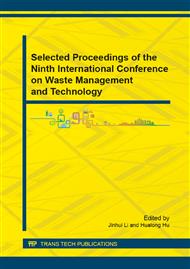[1]
Wen JW, Liu BJ. (2013) China Environment Statistical Yearbook. China Statistical Publishing House.
Google Scholar
[2]
Rai CL, Struenkmann G, Mueller J, Rao PG. (2004) Influence of ultrasonic disintegration on sludge growth reduction reduction and its estiomation by respirometry. Environ Sci and Technol 38 (21): 5779–5785.
DOI: 10.1021/es049775o
Google Scholar
[3]
Yen HW, Brune DE. (2007) Anaerobic co-digestion of algal sludge and waste paper to produce methane. Bioresource Technol 98 (1): 130-134.
DOI: 10.1016/j.biortech.2005.11.010
Google Scholar
[4]
Sosnowski P, Wieczorek A, Ledakowicz S. (2003) Anaerobic co-digestion of sewage sludge and organic fraction of municipal solid wastes. Adv Environ Res 7 (3): 609-616.
DOI: 10.1016/s1093-0191(02)00049-7
Google Scholar
[5]
Sinha A, Singh A, Kumar S, et al. (2014) Microbial mineralization of struvite: A promising process to overcome phosphate sequestering crisis. Water Res 54: 33-43.
DOI: 10.1016/j.watres.2014.01.039
Google Scholar
[6]
Tyagi VK, Lo SL. (2013) Sludge: A waste or renewable source for energy and resources recovery? Renew Sust Energ Rev 25: 708-728.
DOI: 10.1016/j.rser.2013.05.029
Google Scholar
[7]
Zhou Y, Maite PJ, Yuan ZG. (2008) Development of a 2-sludge, 3-stage system for nitrogen and phosphorous removal from nutrient-rich wastewater using granular sludge and biofilms. Water Res 42 (12): 3207-3217.
DOI: 10.1016/j.watres.2008.04.012
Google Scholar
[8]
Tchobanoglous G, Barton F, Stensel H. (2003) Wastewater engineering treatment and reuse. 4th ed. New York: Metcalfe and Eddy.
Google Scholar
[9]
Danesh P, Hong S M, Moon K W, et al. (2008) Phosphorus and heavy metal extraction from wastewater treatment plant sludges using microwaves for generation on exceptional quality bio-solids. Water Environ Res 80 (9): 784–95.
DOI: 10.2175/106143008x276714
Google Scholar
[10]
Appels L, Baeyens J, Degreve J, et al. (2008) Principles and potential of the anaerobic digestion of waste-activated sludge. Prog Energ Combust 34 (6): 755-781.
DOI: 10.1016/j.pecs.2008.06.002
Google Scholar
[11]
Khanal SK, Grewell D, Sung S, Leeuwen J. (2007) Ultrasound applications in wastewater sludge pretreatment: a review. Crit Rev Env Sci Tec 37 (4): 277–313.
DOI: 10.1080/10643380600860249
Google Scholar
[12]
Chen RZ, Pignatello JJ. (1997) Role of quinine intermediates as electron shuttles in Fenton and photoassisted Fenton oxidations of aromatic compounds. Environ Sci and Technol 31: 2399-2406.
DOI: 10.1021/es9610646
Google Scholar
[13]
Pham TTH, Brar SK, Tyagi RD, et al. (2010) Influence of ultrasonication and Fenton oxidation pre-treatment on rheological characteristics of wastewater sludge. Ultrason Sonochem 17: 38-45.
DOI: 10.1016/j.ultsonch.2009.06.007
Google Scholar
[14]
He MH, Wei CH. (2010) Performance of membrane bioreactor (MBR) system with sludge Fenton oxidation process for minimization of excess sludge production. J Hazard Mater 176: 597-601.
DOI: 10.1016/j.jhazmat.2009.11.071
Google Scholar
[15]
Kim DH, Jeong E, Oh SE, et al. (2010) Combined (alkaline+ ultrasonic) pretreatment effect on sewage sludge disintegration. Water Res 44 (10): 3093-3100.
DOI: 10.1016/j.watres.2010.02.032
Google Scholar
[16]
Jin Y, Li H, Mahar R B, et al. (2009) Combined alkaline and ultrasonic pretreatment of sludge before aerobic digestion. J Environ Sci-China 21 (3): 279-284.
DOI: 10.1016/s1001-0742(08)62264-0
Google Scholar
[17]
Xu GH, Chen S H, Shi JW, et al. (2011) Combination treatment of ultrasound and ozone for improving solubilization and anaerobic biodegradability of waste activated sludge. J Hazard. Mater 180: 340-346.
DOI: 10.1016/j.jhazmat.2010.04.036
Google Scholar
[18]
Mohapatra DP, Brar SK, Tyagi RD, et al. (2011) Concomitant degradation of bisphenol A during ultrasonication and Fenton oxidation and production of biofertilizer from wastewater sludge. Ultrason Sonochem 18: 1018-1027.
DOI: 10.1016/j.ultsonch.2011.03.013
Google Scholar
[19]
Jiang JG, Gong CX, Tian SC, et al. (2014) Impact of ultrasonic treatment on dewaterability of sludge during Fenton oxidation. Environmental Monitoring and Assessment. 1-8.
DOI: 10.1007/s10661-014-3988-y
Google Scholar
[20]
Jiang JG, Gong CX, Wang JM, et al. (2014) Effects of ultrasound pre-treatment on the amount of dissolved organic matter extracted from food waste. Bioresource Technol 155: 266-271.
DOI: 10.1016/j.biortech.2013.12.064
Google Scholar
[21]
Jiang JG, Yang SH, Chen MZ, et al. (2009) Disintegration of sewage sludge with bifrequency ultrasonic treatment. Water Sci Technol 60 (6): 1445-1453.
DOI: 10.2166/wst.2009.469
Google Scholar
[22]
Tiehm A, Nickel K, Zellhorn M, et al. (2001) Ultrasonic waste activated sludge disintegration for improving anaerobic stabilization. Water Res 35 (8): 2003–(2009).
DOI: 10.1016/s0043-1354(00)00468-1
Google Scholar
[23]
Zhu SY, Zheng XS, Li DT. (2002) Ozonation of naphthalene sulfonic acids in aqueous solutions. Part I: elimination of COD, TOC and increase of their biodegradability., Water Res 36 (5): 1237-1243.
DOI: 10.1016/s0043-1354(01)00331-1
Google Scholar


